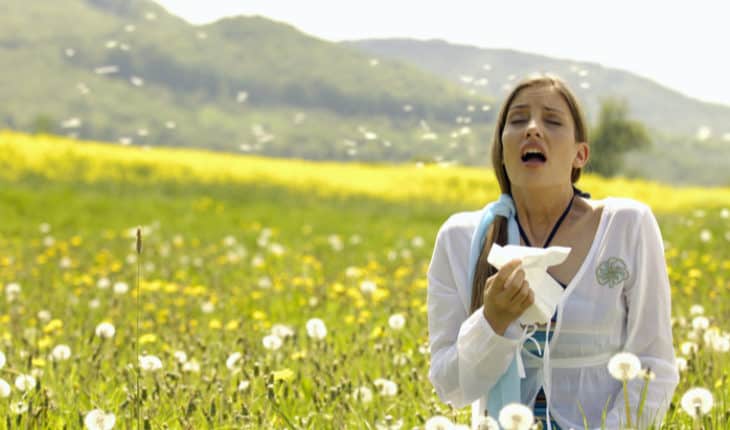A new study by Allergy UK in partnership with Kleenex has revealed that nearly half (49%) of the UK population now suffer from hay fever, almost double the number previously thought.
Hay fever – otherwise known as Seasonal Allergic Rhinitis – was formerly estimated to affect somewhere between 10 and 13 million people in the UK, or 20-30% of the population.
But a poll of over 7000 respondents suggests there has been a significant increase in the number of those with the allergy, as more than a third (37%) said they had developed symptoms for the first time in the last five years. The research has been released to mark the start of Allergy UK’s 2021 Allergy Awareness Week (26-30 April).
With the pollen season running from March-September in the UK, the lifting of lockdown restrictions comes at a potentially difficult time for the increasing number of hay fever sufferers.
Over a third (35%) with the allergy are concerned about spending more time outside as restrictions are lifted, while 32% said their excitement about lockdown lifting has dampened because it is happening during peak pollen season. Meanwhile, over half (56%) are anxious that others may mistake their hay fever symptoms for signs of Covid-19.
The recent rise in people experiencing hay fever may be closely linked to rising temperatures in the UK according to Allergy UK, the leading national charity for people living with allergic conditions.
Amena Warner, Head of Clinical Services at Allergy UK, said: “There is evidence that suggests that climate change, with increasing temperatures may contribute to extending the grass pollen season in the UK. Grass pollen is the cause of the majority of pollen driven hay fever symptoms. Furthermore, with warmer weather, pollen counts can be high, and breeze can spread pollen over a large area as it is carried in the wind.
“Human activities have increased atmospheric concentrations of carbon dioxide (CO2) and other greenhouse gases. Studies are showing that plants produce more pollen as a response to high atmospheric levels of carbon dioxide (CO2), and so people may also find that their hay fever is worse when pollution levels are high, especially in warm weather.
“These are the factors that lead us to expect rising pollen levels in the UK in the coming years, triggering the unpleasant symptoms of hay fever over longer periods”.
The study has also revealed the negative impact of hay fever on people’s quality of life. Nearly two thirds (64%) reported tiredness due to poor sleep quality, while a third (34%) have skipped social engagements due to symptoms.
Workers said that hay fever affects their concentration (46%) and lowers their productivity (35%), whilst a third of sufferers (34%) have reported experiencing embarrassment and anxiety (30%) due to their symptoms. Despite this, 44% have never discussed their hay fever with a healthcare professional.
Hay fever can also discourage people from adopting an active lifestyle. Almost half (49%) of sufferers spend less time exercising outside because of symptoms, while almost a third (30%) have reported weight gain and becoming unfit as a result of not exercising outside.
Amena Warner, Head of Clinical Services at Allergy UK, continued: “Hay fever can sometimes be trivialised, but this research illustrates its real impact on the millions of people across the UK who experience it each year. We know that anxiety about the condition has become worse during the pandemic and we urge anyone who is suffering in silence to speak to a pharmacist or healthcare professional to help find treatments that work for them”
“This year’s Allergy Awareness Week is focused on hay fever, and with support from Kleenex, we have developed more resources to help people manage their symptoms and reduce the impact on day-to-day life at this difficult time”.
Ori Ben Shai, Vice President and Managing Director, Kimberly-Clark UK, said: “We know how unpleasant hay fever can be and this research highlights the issues that millions of people will be facing as we approach peak pollen season. Kleenex is determined to support the UK’s hay fever sufferers and our partnership with Allergy UK will provide them with a range of tools and content to help them manage their symptoms across Allergy Awareness Week and beyond.”
Data from the Kleenex Pollen Forecast suggests hay fever sufferers will need to be aware of high pollen levels across the UK this week. Tree pollen readings are forecasted to be particularly high, potentially leading to a wave of runny noses, sore eyes and sneezing fits.
The severity of pollen levels is measured by Pollen Grains Per Cubic Metre (PPM). A reading of 200-703 for tree pollen is considered high, and anything above 704 very high. Selected regions with currently high tree pollen forecasts for the UK tomorrow include:
Tuesday 27th April:
London 462 PPM
Bristol 450 PPM
Edinburgh 442 PPM
Glasgow 358 PPM
Leeds 473
Liverpool 475
Manchester 472
Nottingham 472
The Kleenex Pollen Forecast is one of the most regionally accurate pollen tracking tools available. It provides a detailed pollen count for all 1.7 million postcodes across the UK three days in advance, enabling those with hay fever to plan days out using pollen data specific to their local town or city, rather than a broad national forecast.
To learn more about hay fever, how to manage it and products that may help to make life more comfortable when experiencing symptoms, please visit the Allergy Awareness Week website
- New lipid-based pathway discovered as key to memory formation - 25th June 2025
- Crucial link could explain how Alzheimer’s takes hold - 25th June 2025
- Understanding Your Mind Can Improve Daily Life - 25th June 2025







